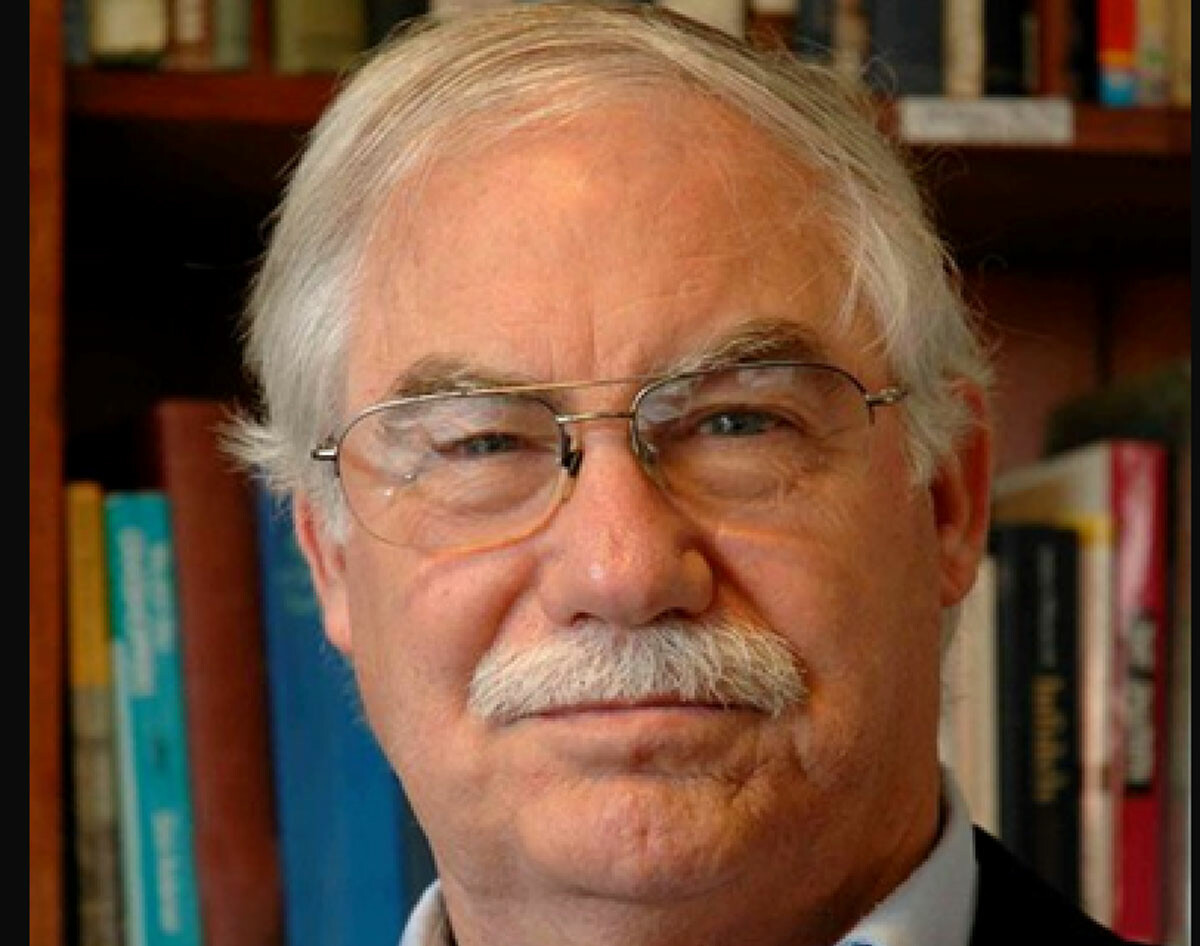
My Tribute to Greg Livingstone (1940–2025)
By John Piper
Greg Livingstone, founder of Frontiers, one of the largest missions agencies seeking to reach Muslims for Christ, finished his 85-year race on July 19, 2025. Seventeen years ago, when we invited Greg to speak at the Desiring God Pastors’ Conference, I wrote, “Greg Livingstone is one of my heroes.” Since then, that truth has only deepened.
I measure heroism by obstacles overcome in a great cause. Greg’s life started in the face of obstacles, and he stayed there for a lifetime, triumphant in weakness. He was born Gregory Martindale Foss on May 3, 1940. It was not an auspicious beginning.
I like to imagine my heavenly Father and Creator looking down on earth in 1939, musing, “The missionaries are getting a bit bland and stereotypical. I think I’ll combine a Jewish scholar with a feisty chorus-girl comedienne.” (You’ve Got Libya, 26–27)
It worked. He was not bland. And he was not stereotypical. He never knew his father. His biological parents never married. His mother later married Bob Livingstone (hence the name), but the marriage broke up. Unwanted by his mother, he was raised in foster homes.
One of those families, the Ringles of Aspen, Colorado, were Christians. God used them to overcome the greatest obstacle: Greg’s lostness.
At age 16 he asked Judy Ringle to go to a movie with him; she declined, but agreed to go to a theater with him Sunday morning instead. It turned out to be an evangelistic Christian service! Judy’s parents invited him to dinner where they gave him a Gospel of John challenging him to ask God to show him if it was true. In the next couple of weeks, “A feeling had come over me with which I was totally unacquainted with. . . . Jesus . . . was still alive and had taken up residence in me.” (Global Prayer Digest, December 2018)
I had finally been adopted by a Father who would stick with me. . . . As incredible as it sounds, I can testify honestly that from that incident in 1956 to this very day, I have consciously sought to be obedient to the commands of God as I understood them. (Libya, 52)
‘You’ve Got Libya’
Greg attended Wheaton College — largely, he said, because they were Christians, and half of them were girls. One of those girls was Sally, a premed student preparing to serve in Pakistan or Egypt. They married soon after graduating and served in missions together until the old soldier’s body gave out on July 19.
“Seventeen years ago, I wrote, ‘Greg Livingstone is one of my heroes.’ Since then, that truth has only deepened.”
In October 1959, at age 19, while still at Wheaton, Greg stumbled into a meeting that would shape the rest of his life. Dale Rhoton invited him to an all-night prayer meeting at Moody Bible Institute. The leader of the group was twenty-year-old George Verwer. Standing over a world map on the floor, Greg was asked the incomprehensible question, “What country are you claiming, brother?” To conceal his ignorance, he said, “What’s left?” The answer came back, “Libya. You’ve got Libya.”
“Though I didn’t realize it at the time, that night was my life’s turning point. . . . Today, I call it being chosen to be an apostle to the Muslim peoples of the earth” (Libya, 80–81). It also became the title of his autobiography, You’ve Got Libya.
He explained what he meant by apostles:
A cadre of people in every generation who are called out of ordinary life to do nothing but labor night and day to see communities of obedient Christ followers established among all the peoples who still don’t have adequate access to the Christians who know, communicate, and demonstrate the good news. (Libya, 83)
This is what he gave his life to for the next six decades. He called it his sheepdog ministry.
Over the years, I gradually realized that the great Shepherd has chosen to utilize me most often as a sheepdog. . . . I’ve been a recruiter, one who keeps God’s sheep moving in the direction of his not-yet-harvested fields. (Global Prayer Digest)
He had a habit of nipping at the heels of Christians in ways that made many of us want to lay down our lives for King Jesus. For example, about a month ago, he told the story of the time he stood before a large Christian college chapel to give a two-minute message.
I stood up and asked, “How many of you are praying for the 53 American hostages being held in Iran?” Hands went up all over the auditorium. “And how many of you are praying for the 53 million Iranians, who are going to die and be separated from Christ forever, unless missionaries bring the gospel to them?” Maybe two or three students raised a hand. “Oh,” I said in closing, “I’m sorry. I thought this was a Bible-believing college.”
Boldness Without Bitterness
But believe me, he was not bitter. He never sank into cynicism over the seeming indifference of many Christians to the plight of a billion lost Muslims. The sorrows of lost millions could not cancel the joyful wonder that he belonged to Christ. “Sorrowful, yet always rejoicing” (2 Corinthians 6:10). He kept speaking and inspiring and mobilizing until his body gave out with the spread of prostate cancer into his bones.
He wrote to me last November with his relentless heart-cry:
Pray for at least two Church Planting teams, each with six members with gifts differing, and the right team leader, to emerge from the 175 students to whom I will be pouring my heart out, and counting on our Lord to sustain me in my weakness.
My early dementia causes “blank outs” . . . so I’m mainly doing Q&A . . . one issue at a time . . . especially seeking to deal with evangelical universalism [which he believed was severing the nerve of risk and perseverance in missions].
To that end, I am flying to Germany on Nov. 5th [2024] for a week to challenge 175 mission minded European young people to “give up their small ambitions,” and fears, to believe the Lord Jesus who said, “unless they believe in Me, they will perish” (eternally).
The sacrifices that he and Sally made for the sake of world missions did not make him self-pitying or boastful. A witty veteran missionary taught him a lesson early about sacrifice. He made a trip to Honduras, where the missionary showed him to his lodging in the village. Before closing the door, she said, “If there’s anything you need, just let us know and we’ll tell you how to get along without it!’” (Libya, 87).
Kept Humble
One way his Lord kept him humble was by keeping him aware of the price others had paid. For example, he told of a dream.
I was on the stage in heaven, standing shoulder to shoulder with many others. We were looking out at the multitude that no man could number. I realized the Lord himself was speaking about me! . . . I was feeling great!
Then I turned to a man next to me, who was a head shorter than me and evidently from another era. I asked him, “What happened to you, brother?”
“Oh,” he replied, rather nonchalantly, “I was burned at the stake.” (Libya, 20)
Cheerful self-deprecation marked his life as long as I knew him.
Augustine, who said, “In the presence of God I am always wrong.” . . . The Holy Spirit showed me that except for Christ’s beauty, righteousness, and work in my life, I am rotten to the core. Everything I do has mixed motives. Self is never entirely out of the picture. What a battle I’ve fought throughout my life to stop seeking the approval of men. No wonder our Lord insisted in John 12 that unless a grain of wheat falls into the ground and dies, it will not produce fruit. (Libya, 97–98)
One of the things Greg died to was the notion of retirement. When he stepped down from being general director of Frontiers at the age of sixty, “he and Sally went to Southeast Asia to do what they had been recruiting others to do: church planting among Muslims” (Global Prayer Digest).
Partners in the Greatest Cause
He loved deep camaraderie in the greatest cause. From the beginning, he was formed by powerful, resilient relationships.
God was ushering into my life a wonderful cadre of men of influence. . . . I was gaining evangelistic experience under Campus Crusade’s Pete Gilchrist, pastoral care from Evan Welsh, Reformed theology from Kenneth Kantzer and Walt Kaiser, and vision for unreached peoples from George Verwer and Dale Rhoton. (Libya, 95, 97)
But no one’s influence surpassed George Verwer’s. If Greg was a wonderful combination of energy and sorrow and suffering and joy and dogged perseverance and single-minded passion for the lost, one did not need to look far for the relational roots of these traits. To know Greg Livingstone and then to meet George Verwer was to say, “Oh, now I understand.”
To this day, the one who had the greatest impact was my lifelong friend George Verwer. Only eighteen months my senior, the skinny, large-nosed, Dutch-American from New Jersey picked me up in the same way that the Lord Jesus picked up Matthew the tax collector. I could not help but follow him. . . . For more than fifty years, George has kept me on his radar. He calls, he writes, he visits, and he prays. (Libya, 97–98)
Greg and Sally were a team for six decades. For better or for worse. Their marriage was a portrait of Christ’s covenant love for his bride, and her devotion to the man God gave her in the cause of Christ. Last August, Greg wrote to me about Sally’s ministry:
She inspires me to “keep on, keeping on,” praying, corresponding, or calling on Zoom risk-taking missionaries in Libya, Syria (Mazhar), Baghdad, Yemen, Kuwait, Malaysia, Brunei, and among the Pashtun in Pakistan, and the Muslims in India!
God only knows how many thousands of people Greg and Sally wooed and catapulted and enticed and dragged and barked and nipped (like a sheepdog and his mate) toward missions and toward Christ. I am praying that God will raise up more Verwers and Livingstones to finish the Great Commission. They were faithful in their generation. It was a great privilege to know them.
